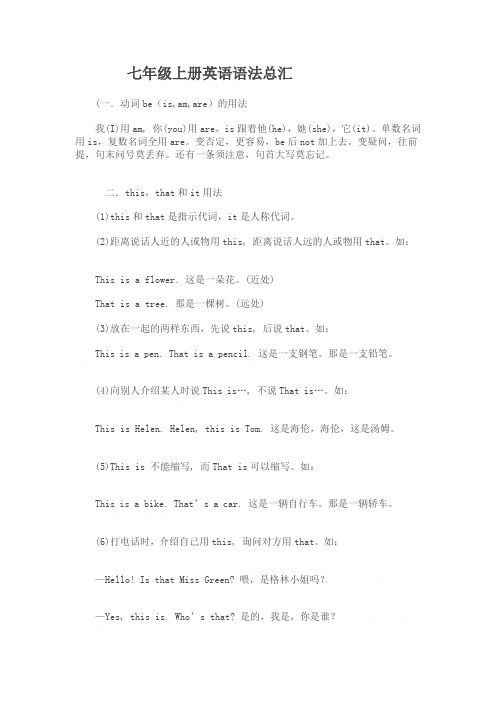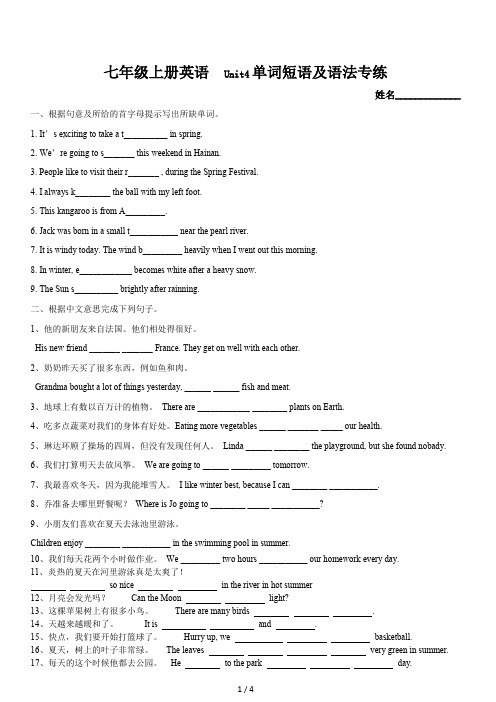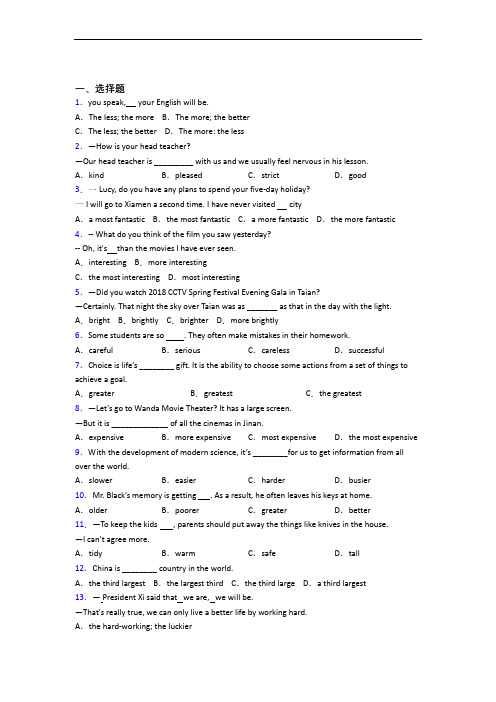2013广州七年级上册英语语法之U4语法:形容词
2013 七年级上册英语语法归纳2013 七年级上册英语语法归纳

七年级上册英语语法总汇(一.动词be(is,am,are)的用法我(I)用am, 你(you)用are,is跟着他(he),她(she),它(it)。
单数名词用is,复数名词全用are。
变否定,更容易,be后not加上去。
变疑问,往前提,句末问号莫丢弃。
还有一条须注意,句首大写莫忘记。
二.this,that和it用法(1)this和that是指示代词,it是人称代词。
(2)距离说话人近的人或物用this, 距离说话人远的人或物用that。
如:This is a flower. 这是一朵花。
(近处)That is a tree. 那是一棵树。
(远处)(3)放在一起的两样东西,先说this, 后说that。
如:This is a pen. That is a pencil. 这是一支钢笔。
那是一支铅笔。
(4)向别人介绍某人时说This is…, 不说That is…。
如:This is Helen. Helen, this is Tom. 这是海伦,海伦,这是汤姆。
(5)This is 不能缩写, 而That is可以缩写。
如:This is a bike. That’s a car. 这是一辆自行车。
那是一辆轿车。
(6)打电话时,介绍自己用this, 询问对方用that。
如:—Hello! Is that Miss Green? 喂,是格林小姐吗?—Yes, this is. Who’s that? 是的,我是,你是谁?注意:虽然汉语中使用“我”和“你”,但英语中打电话时绝不可以说:I am…, Are you…?/Who are you?(7)在回答this或that作主语的疑问句时, 要用it代替this或that。
如:①—Is this a notebook? 这是笔记本吗?—Yes, it is. 是的,它是。
②—What’s that? 那是什么?—It’s a kite. 是只风筝。
三.these和those用法this, that, these和those是指示代词,these是this的复数形式,指时间,距离较近的或下面要提到的人或事;those是that的复数形式,指时间、距离较远或前面已经提到过的人或事物。
七年级英语 U4 语法It is + adj.+ to do sth. Teaching Design

It is + adj.+ to do sth. Teaching DesignPart One: Teaching Background“It is +adj.+to do sth.” is an important part of the 7A Unit 4 grammar in Oxford English. For most Grade 7 students, grammar is a big headache, so the microlecture introduces their favorite character Peppa to arouse their interest and uses lots of interesting pictures to make it easier to understand and remember. Considering that students have very weak awareness of English sentence pattern and are usually confined to the Chinese way of thinking, the microlecture designs several kinds of exercises varying in degree of difficulty so that students can use the pattern correctly and confidently.Part Two: Teaching Objectives1.To enable students to find out the sentence pattern through observation;2.To enable students to understand the structure of the pattern: the use of “it” asanticipatory subject and “to do sth.” as the real subject.3.To enable students to use the pattern to describe actions and express their ideas. Part Three: Difficult Points and Important Points of Teaching1.Difficult points: The difficult part of the teaching is how to help studentsunderstand the use of “it” as anticipatory subject and “to do sth.” as the real subject.2.Important points: The most important part of the teaching is strengtheningstudents’ awareness of the sentence pattern through practice and thus enabling them to use it correctly and confidently whenever necessary.Part Four: Teaching Procedures1.Sensing the language: Present four pictures of Peppa and the correspondingsentences to arouse students’ interest and provide fresh material for the next step.2.Finding out the sentence pattern: Group the four sentences together, ask andlead students to find out the pattern of “It is + adj.+ to do sth.” through close observation.3.Understanding the structure: Ask students what “it” refers to and help them findout that the real subject is “to do sth.” while “it” is the anticipatory subject.Then help students know adjectives that are usually used in the structure by asking the third question:What kind of adjectives can we use in the sentence pattern?4.Practicing the sentence pattern: Starting with easy ones and gradually movingon to difficult ones, some exercises are given to check and consolidate what students have just learned.Part Five: ReflectionsGrammar is best learned in use and in fun, so fun and practice are the core of the teaching design. Fun can make grammar easier to learn, and practice can help turn knowledge into ability. I hope this microlecture is helpful for our students who are afraid of learning grammar.。
广州市最新版七年级上册英语 Unit4单词短语及语法专练

七年级上册英语Unit4单词短语及语法专练姓名_____________一、根据句意及所给的首字母提示写出所缺单词。
1. It’s exciting to take a t__________ in spring.2. We’re going to s_______ this weekend in Hainan.3. People like to visit their r_______ , during the Spring Festival.4. I always k________ the ball with my left foot.5. This kangaroo is from A_________.6. Jack was born in a small t___________ near the pearl river.7. It is windy today. The wind b_________ heavily when I went out this morning.8. In winter, e____________ becomes white after a heavy snow.9. The Sun s__________ brightly after rainning.二、根据中文意思完成下列句子。
1、他的新朋友来自法国。
他们相处得很好。
His new friend _______ _______ France. They get on well with each other.2、奶奶昨天买了很多东西,例如鱼和肉。
Grandma bought a lot of things yesterday, ______ ______ fish and meat.3、地球上有数以百万计的植物。
There are ____________ ________ plants on Earth.4、吃多点蔬菜对我们的身体有好处。
广州市初中英语语法知识—形容词的解析

一、选择题1.you speak,_ your English will be.A.The less; the more B.The more; the betterC.The less; the better D.The more: the less2.—How is your head teacher?—Our head teacher is _________ with us and we usually feel nervous in his lesson.A.kind B.pleased C.strict D.good3.一Lucy, do you have any plans to spend your five-day holiday?一I will go to Xiamen a second time. I have never visited cityA.a most fantastic B.the most fantastic C.a more fantastic D.the more fantastic 4.-- What do you think of the film you saw yesterday?-- Oh, it's than the movies I have ever seen.A.interesting B.more interestingC.the most interesting D.most interesting5.—Did you watch 2018 CCTV Spring Festival Evening Gala in Taian?—Certainly. That night the sky over Taian was as _______ as that in the day with the light. A.bright B.brightly C.brighter D.more brightly6.Some students are so . They often make mistakes in their homework.A.careful B.serious C.careless D.successful 7.Choice is life’s ________ gift. It is the ability to choose some actions from a set of things to achieve a goal.A.greater B.greatest C.the greatest8.—Let’s go to Wanda Movie Theater? It has a large screen.—But it is _____________ of all the cinemas in Jinan.A.expensive B.more expensive C.most expensive D.the most expensive 9.With the development of modern science, it’s ________for us to get information from all over the world.A.slower B.easier C.harder D.busier10.Mr. Black’s memory is getting . As a result, he often leaves his keys at home.A.older B.poorer C.greater D.better11.—To keep the kids , parents should put away the things like knives in the house.—I can’t agree more.A.tidy B.warm C.safe D.tall12.China is ________ country in the world.A.the third largest B.the largest third C.the third large D.a third largest13.— President Xi said that we are, we will be.—That's really true, we can only live a better life by working hard.A.the hard-working; the luckierB.the more hard-working; the luckierC.more hard-working; luckier14.-Helen, can I wear jeans and a T-shirt to the school talent show?-OK, but a dress might be____.A.good B.bad C.better D.worse15.I think Journey to the West is ______ of all the Chinese novels.A.interesting B.more interestingC.most interesting D.the most interesting16.— Why do you like living in the countryside?一Because there's noise and fewer cars there.A.less B.little C.fewer D.few17.----How are you getting on with your cousin?-----Very well. He is really _______ and joins in all kinds of activities in his spare time. A.polite B.strict C.active D.careful 18.These days lots of people are working_________ to get_________ for their living. A.hard enough; enough money B.enough hardly; money enough C.enough hard; money enough D.hardly enough; enough money19.-Many boy students think math is ______ English.-I agree. I’m weak in English.A.much difficult than B.so difficult asC.less difficult than D.more difficult than20.The bridge between the two islands is_______one in Suzhou.A.long B.longer C.longest D.the longest 21.—Are you taller than your cousin, Mike?—No, I am as ______ as him.A.tall B.taller C.high D.higher 22.Julia is very clever.In fact,I doubt whether anyone in the class has_______ IQ.A.a high B.a higher C.the higher D.the highest 23.Mr. Bean’s movies are always very_________ and many people are made to laugh. A.boring B.sad C.funny D.successful24.Li Yundi is one of _____ pianists in China now and he showed up at the 2012 Spring festival Gala.A.more popular B.the worst C.better D.the best 25.—More and more cities in China begin to build subways!—That’s right! It will make our lives than before.A.the busiest B.busier C.the easiest D.easier【参考答案】***试卷处理标记,请不要删除一、选择题1.B解析:B【解析】句意:你说得越多,你的英语就会越好。
广州新版七年级上册英语unit1--unit4新课讲义全

广州新版七年级上册英语unit1--unit4新课讲义全Module 1Unit 1 Making friendsAnna’s blogHello everyone. Welcome to my blog.About meMy name is Anna. I'm from Germany. I'm 11 years old. I'm tall and thin. I have long hear.I live with my family in a house close to some mountains. My mum is an Art teacher. My dad is a doctor. I have an elder sister and an elder brother.About my school and my hobbiesEver day, I go to school by school bus. My favorite subjects are Maths, Art and Science. I like my school because the teachers are all very friendly. My dream is to be an engineerI like many sports. I'm good at swimming and playing basketball. There are my favorite hobbies.I want to make friends with young people from all over the world! Email me, Please!Words and expressionsGerman adj. 德国的blog n. 博客grammar n. 语法sound n. 声音complete v. 完成hobby n. 爱好country n. 国家age n. 年龄dream n. 梦想everyone pron. 人人,所有人Germany adj. 德国mountain n. 山;山脉elder adj. 年长的friendly adj. 友好的engineer n. 工程师world n. 世界Japan n. 日本flat n. 公寓yourself pron. 你自己. US 美国close to (在空间,时间上)接近go to school 去上学(be) good at 擅长make friends with 与…….交朋友all over 遍及‘d like to =would like to 愿意课文容精析1. Welcome to my blog. welcome to sp. 欢迎来到某地2. I’m from Germany. 我来自德国。
初中英语知识点归纳形容词和副词的用法区别总结

初中英语知识点归纳形容词和副词的用法区别总结形容词和副词是英语语法中的两个重要部分。
它们在句子中具有不同的作用和用法。
下面是对初中英语知识点中形容词和副词用法区别的总结。
一、形容词的用法1. 形容词可以修饰名词,并在句中作定语,用于描述名词的性质、特征或状态。
例句:a beautiful girl(一个美丽的女孩)2. 形容词可以充当表语,与系动词be连用,用于描述主语的性质或状态。
例句:She is intelligent.(她很聪明。
)3. 形容词可以在句中作宾语补足语,用于补充说明及描述宾语。
例句:I found the movie interesting.(我觉得这部电影有趣。
)4. 形容词可以用来表示数量或顺序的范围。
例句:He has only three books.(他只有三本书。
)二、副词的用法1. 副词可以修饰动词,用于描述动作的方式、频率、程度等。
例句:She runs quickly.(她跑得很快。
)2. 副词可以修饰形容词,用于描述形容词所修饰的程度。
例句:He is very tall.(他非常高。
)3. 副词可以修饰其他副词,用于描述副词之间的程度关系。
例句:He speaks English quite fluently.(他英语说得相当流利。
)4. 副词可以在句中作状语,表示时间、地点、原因、方式、条件等。
例句:We will go to the park tomorrow.(我们明天去公园。
)三、形容词和副词的区别1. 作用对象不同- 形容词主要用于修饰名词,描述名词的性质、特征或状态。
- 副词主要用于修饰动词、形容词、其他副词,表示动作的方式、程度、频率等。
2. 词性不同- 形容词是描述性词,属于形容词类。
- 副词是修饰性词,属于副词类。
3. 位置不同- 形容词通常位于名词之前,修饰名词。
- 副词可以位于动词、形容词、副词等之前或之后,修饰这些词。
4. 用法不同- 形容词在句中可以作定语、表语、宾语补足语等。
初中英语知识点归纳形容词和副词归纳
初中英语知识点归纳形容词和副词归纳英语中的形容词(Adjective)和副词(Adverb)是我们学习英语语法必须要掌握的重要知识点。
形容词用来修饰名词,描述事物的性质和特征;而副词则用来修饰动词、形容词、副词等,表示程度、方式、时间等。
一、形容词的基本用法1. 形容词的位置:形容词通常位于名词前面。
例句:- A beautiful flower.- The tall boy.2. 形容词的比较级和最高级:形容词的比较级表示两个人或物之间的比较,最高级表示三个或三个以上人或物之间的比较。
例句:- This book is more interesting than that one.- Lily is the tallest girl in our class.3. 形容词的修饰范围:形容词可以修饰单数或复数的名词。
例句:- The red apple is sweet.- The red apples are sweet.4. 形容词的性、数和格的变化:形容词的形式根据名词的性、数和格的变化而变化。
例句:- He is a happy boy.- She is a happy girl.二、常见形容词分类1. 大小、长短、高低等形容词:- big(大)- small(小)- long(长)- short(短)- tall(高)- low(低)2. 颜色形容词:- red(红色)- blue(蓝色)- green(绿色)- yellow(黄色)3. 品质形容词:- good(好的)- bad(坏的)- happy(快乐的)- sad(伤心的)三、副词的基本用法1. 副词的位置:副词通常位于动词或形容词之后。
例句:- He runs quickly.- She speaks English fluently.2. 副词修饰动词的方式:副词可以修饰动词,表示动作的方式。
例句:- She sings beautifully.- He speaks loudly.3. 副词修饰形容词或副词的程度:副词可以修饰形容词或副词,表示程度或程度的变化。
七年级语法第5讲 形容词
1 专题学习-形容词 【导入】 1) He looks happy. He is a happy boy. 2) He is looking at the dog happily. 思考: 1.形容词和副词用法有什么不同点? 2.形容词修饰什么词?副词修饰什么词?
【重点讲解】 知识点1: 形容词用法 1.形容词概念:用来修饰名词,表示人或事物的性质、状态和特征的词,叫形容词。 2.形容词作用,是用来修饰、描绘名词的,通常在句中作定语、表语或宾补,有时还可作状语。 如:This is an interesting book. (作定语) He is honest and hardworking. (作表语) I found the book interesting. (作宾补) 3. 在连系动词后+adj 作表语;连词动词有 A. be(是),look(看起来),feel(摸上去), smell(闻起来),taste(尝起来),sound(听起来), seem(似乎是), appear(似乎、显得)等。 B ..表“保持”词:remain(依然),keep(保持),stay(保持),continue(继续、仍旧), C. 表"变化"的词:become(变成), turn(变成), grow(变得), get(变得),go(由好变坏)等 例如: The story sounds true. Why don't you put the meat in the fridge? It will stay fresh for several days. Put the fish in the fridge, or it will go bad in hot weather. 注意:1). 只能作表语的形容词: alone,alive,afraid,asleep,ill,interested,excited, surprised等。 如:That old man feels alone because his children are out. I'm afraid he can't come. 2). 以ly结尾的形容词有friendly,lively,lovely,lonely,likely ,lovely,等。 eg. Her singing was lovely. 3).有些以-ly 结尾既为形容词,也为副词,如daily,weekly,monthly,yearly,early等。 The Times is a weekly paper. 《时代周刊》为周刊。 4.做宾语补足语 get sb\sth adj 使得某人、物------的 2
2013人教版七年级上单词整理(含释义、音标,时态变化,词性变化)
good/gud/ adj. 好的2013人教版英语教科书7级上morning/'mɔ:niŋ/ n. 早晨;上午2013人教版英语教科书7级上Good morning早上好!2013人教版英语教科书7级上hi/hai/interj. (打招呼)嗨;喂.2013人教版英语教科书7级上hello/hə'ləu/interj. 你好;喂2013人教版英语教科书7级上afternoon/,a:ftə'nu:n/ n. 下午2013人教版英语教科书7级上Good afternoon!下午好!2013人教版英语教科书7级上evening/'i:vniŋ/n. 晚上;傍晚2013人教版英语教科书7级上Good evening!晚上好!2013人教版英语教科书7级上how/hau/adv. 怎样;如何2013人教版英语教科书7级上are/a:/v. 是2013人教版英语教科书7级上you/ju:/pron. 你;你们(主宾格相同)2013人教版英语教科书7级上How are you?你好吗?2013人教版英语教科书7级上I /ai/pron. 我(me的主格)2013人教版英语教科书7级上am/æm/ v. 是版英语教科书7级上fine/fain/ adj.美好的;adv.精巧地;n.&v.罚款2013人教版英语教科书7级上thanks/θæŋks/ interj.&n. 感谢;谢谢2013人教版英语教科书7级上OK/əu'kei/interj.&adv. 好的;行;可以2013人教版英语教科书7级上what /wɔt/pron.&adj. 什么2013人教版英语教科书7级上is/iz/v. 是2013人教版英语教科书7级上this /ðis/pron. 这;这个2013人教版英语教科书7级上in/in/pron.在里面;用、以某种方式2013人教版英语教科书7级上English /'iŋgliʃ/n. 英语;英格兰人2013人教版英语教科书7级上English /'iŋgliʃ/adj. 英语的;英格兰的2013人教版英语教科书7级上map /mæp/v. 地图2013人教版英语教科书7级上cup /kʌp/n. 杯子(尤其指咖啡杯)2013人教版英语教科书7级上ruler /'ru:lə/n. 尺子;直尺2013人教版英语教科书7级上pen/pen/n. 签字笔;钢笔2013人教版英语教科书7级上orange/'ɔrindʒ/n. 橙子;香橙版英语教科书7级上jacket/'dʒækit/n. 夹克衫;短上衣2013人教版英语教科书7级上key /ki:/ n. 钥匙;关键点,重点adj. 关键的2013人教版英语教科书7级上quilt /kwilt/n. 被子;床罩2013人教版英语教科书7级上it/it/pron. 它2013人教版英语教科书7级上a /ə/art. 一个( (用于单数可数名词前))2013人教版英语教科书7级上that /ðæt/pron. 那;那个2013人教版英语教科书7级上spell /spel/v. 用字母拼写;拼读;意味着2013人教版英语教科书7级上please /pli:z/interj. (用于客气地请求或吩咐)请2013人教版英语教科书7级上please /pli:z/v. 使喜欢、高兴;令人喜欢、高兴2013人教版英语教科书7级上color / colour /'kʌlə/n. 颜色;v. 粉饰,给…涂颜色2013人教版英语教科书7级上red/red/ n. 红色;红颜料;adj. 红色的;红肿充血的2013人教版英语教科书7级上yellow /'jeləu/ n. 黄色;黄颜料;黄种人;adj. 黄色的;黄皮肤的;v. 涂黄2013人教版英语教科书7级上green/gri:n/n. 绿色;青春;adj. 绿色的;v. 涂绿2013人教版英语教科书7级上blue/blu:/ n. 蓝色;蓝颜料;布鲁斯歌曲种类;adj. 蓝色的;忧郁的;下流的;v. 涂蓝2013人教版英语教科书7级上black/blæk/ v. 黑色;黑颜料;黑人;adj. 黑色的;邪恶的;v. 变黑,弄脏;把眼睛打青肿2013人教版英语教科书7级上white/wait/n. 白色;白种人;adj. 白色的;纯洁的;v. 涂白2013人教版英语教科书7级上purple /'pə:pl/ n. 紫色;紫色的;adj. 帝王的;华而不实的;v. 涂紫色2013人教版英语教科书7级上brown/braun/ n. 棕色、褐色;adj. 棕色的;太阳晒黑的;v. 变成棕色2013人教版英语教科书7级上the /ði; ðə/art. 特指已提到的人或事物2013人教版英语教科书7级上now/nau/adv. 现在;当下;目前2013人教版英语教科书7级上see/si:/v. 看;看见;领会、理解、明白2013人教版英语教科书7级上can/kæn/modal v. 能,可以;罐头2013人教版英语教科书7级上say/sei/v. 说,讲2013人教版英语教科书7级上my/mai/pron. 我的2013人教版英语教科书7级上name/neim/n. 名字,姓名,名称2013人教版英语教科书7级上nice/nais/adj. 令人愉快的,宜人的,好的2013人教版英语教科书7级上to/tu:/ 常用于原形动词之前,该动词为不定式2013人教版英语教科书7级上to/tu:/向,给,为了版英语教科书7级上meet/mi:t/n.&v. 遇见,相逢2013人教版英语教科书7级上too/tu:/adv. 也,又,太2013人教版英语教科书7级上your /jɔ:/adv. 你的;你们的2013人教版英语教科书7级上Ms/miz/ (于女子的姓名前,不指明婚否)2013人教版英语教科书7级上his/hiz/pron. 他的2013人教版英语教科书7级上and/ænd/conj. 和;而且2013人教版英语教科书7级上her/hə:/pron. 她的2013人教版英语教科书7级上yes/jes/interj. 对;是的;可以2013人教版英语教科书7级上she /ʃi:/pron. 她(her的主格)2013人教版英语教科书7级上he/hi:/pron. 他(him的主格)2013人教版英语教科书7级上no/nəu/interj. 不;没有;不是2013人教版英语教科书7级上not /nɔt/adv. 不;不是2013人教版英语教科书7级上zero /'ziərəu/num. 零2013人教版英语教科书7级上one /wʌn/num. 一版英语教科书7级上two/tu:/num. 二2013人教版英语教科书7级上three/θri:/num. 三2013人教版英语教科书7级上four /fɔ:/num. 四2013人教版英语教科书7级上five/faiv/num. 五2013人教版英语教科书7级上six/siks/num. 六2013人教版英语教科书7级上seven/'sevn/num. 七2013人教版英语教科书7级上eight/eit/num. 八2013人教版英语教科书7级上nine/nain/num. 九2013人教版英语教科书7级上telephone/'telifəun/n. 电话,电话机2013人教版英语教科书7级上number/'nʌmbə/n. 号码;数字2013人教版英语教科书7级上phone/fəun/n. 电话,电话机2013人教版英语教科书7级上first /fə:st/adj. 第一的2013人教版英语教科书7级上last/la:st/adj. 最后的;末尾的2013人教版英语教科书7级上friend/frend/n. 朋友版英语教科书7级上China/'tʃainə/n. 中国(china是瓷器)2013人教版英语教科书7级上middle /'midl/n.&v. 中间;中间的2013人教版英语教科书7级上school/sku:l/n. 学校2013人教版英语教科书7级上middle school中学2013人教版英语教科书7级上sister /'sistə/n. 姐妹;姐姐;妹妹2013人教版英语教科书7级上mother/'mʌðə/n. 母亲;妈妈2013人教版英语教科书7级上father/'fa:ðə/n. 父亲;爸爸2013人教版英语教科书7级上parent/'peərənt/n. 父母;父;母2013人教版英语教科书7级上brother /'brʌðə/n. 兄弟;哥哥;弟弟2013人教版英语教科书7级上grandmother/'grænmʌðə/n. 奶奶;外婆2013人教版英语教科书7级上grandfather/'grænmʌðə/n. 爷爷;外公2013人教版英语教科书7级上grandparent/'grænpeərənt/n. 祖父母;外祖父母2013人教版英语教科书7级上family /'fæməli/n. 家庭;家人2013人教版英语教科书7级上those /ðəuz/pron. 那些版英语教科书7级上who/hu:/pron. 谁;什么人2013人教版英语教科书7级上oh/əu/interj. 噢2013人教版英语教科书7级上these/ði:z/pron. 这些2013人教版英语教科书7级上they/ðei/pron. 他们2013人教版英语教科书7级上well/wel/interj. 嗯,好吧;adj. 好好的;(多指身体健康)adv. 好好地;n. 水井2013人教版英语教科书7级上have/hæv/v. 有;经历,经受2013人教版英语教科书7级上Have a good day!过得愉快!(表示祝愿)2013人教版英语教科书7级上bye/bai/interj. 拜拜,再见2013人教版英语教科书7级上son/sʌn/n. 儿子2013人教版英语教科书7级上cousin /'kʌzn/n. 堂兄弟姐妹;表兄弟姐妹2013人教版英语教科书7级上aunt/a:nt/n. 姑母;姨母;伯母;婶母;舅母2013人教版英语教科书7级上uncle/'ʌŋkl/ n. 舅父;叔父;伯父;姑父;舅父2013人教版英语教科书7级上daughter /'dɔ:tə/n. 女儿2013人教版英语教科书7级上here /hiə/adv. 在这里;这就是版英语教科书7级上photo /'fəutəu/n. 照片2013人教版英语教科书7级上of/ɔv, əv/prep. 属于;关于;是…的2013人教版英语教科书7级上next/nekst/adj.&n.下一个的;下一个,接下来2013人教版英语教科书7级上picture/'piktʃə/n. 图片;图画;景色2013人教版英语教科书7级上girl /gə:l/n. 女孩子2013人教版英语教科书7级上dog /dɔg/n. 狗2013人教版英语教科书7级上pencil/'pensl/n. 铅笔2013人教版英语教科书7级上book/buk/n 书本2013人教版英语教科书7级上eraser/i'reizə/n. 橡皮擦2013人教版英语教科书7级上box /bɒks/n. 箱子,盒子;包厢;v. 拳击2013人教版英语教科书7级上schoolbag /'sku:lbæg/n. 书包2013人教版英语教科书7级上dictionary /'dikʃənəri/n. 字典;词典2013人教版英语教科书7级上his/hiz/pron. 他的2013人教版英语教科书7级上hers /hə:z/pron. 她的版英语教科书7级上mine/main/pron. 我的2013人教版英语教科书7级上excuse/ik'skju:z/v. 原谅;宽恕;n. 借口2013人教版英语教科书7级上me/mi:/pron. 我(I的宾格)2013人教版英语教科书7级上excuse me不好意思;劳驾;请原谅我2013人教版英语教科书7级上thank /θæŋk/v. 感谢;谢谢2013人教版英语教科书7级上tacher/'ti:tʃə/n. 老师;教师2013人教版英语教科书7级上about /ə'baut/prep. 关于;大约,大概2013人教版英语教科书7级上What about...?怎么样?(询问消息或提出建议)2013人教版英语教科书7级上yours /jɔ:z/pron. 你的;你们的2013人教版英语教科书7级上for /fɔ:/prep, 为了;给;因为2013人教版英语教科书7级上thank you for因为某事而感谢2013人教版英语教科书7级上help/help/n.&v. 帮助;援助2013人教版英语教科书7级上welcome /'welkəm/n.&v. 欢迎;adj. 受欢迎的2013人教版英语教科书7级上You're welcome.别客气版英语教科书7级上baseball /'beisbɔ:l/n.棒球2013人教版英语教科书7级上watch /wɒtʃ/v. 看,观看;看守;n. 手表2013人教版英语教科书7级上computer /kəm'pju:tə/n. 计算机,电脑2013人教版英语教科书7级上game/geim/n. 游戏;运动;比赛2013人教版英语教科书7级上card /kɑ:d/n. 卡片,纸牌2013人教版英语教科书7级上notebook /'nəutbuk/n. 笔记本2013人教版英语教科书7级上ring /riŋ/ n. 指环,戒指;铃声,钟声;v. 按铃,敲钟2013人教版英语教科书7级上bag/bæg/ n. 袋子,包包;v. 把…装进袋子;占据,私吞2013人教版英语教科书7级上in /in/prep. 在......里2013人教版英语教科书7级上library/'laibrəri/n. 图书馆2013人教版英语教科书7级上ask /ɑ:sk/ v. 请求;要求;询问2013人教版英语教科书7级上ask... for... 请求;恳求(给予) 2013人教版英语教科书7级上find /faind/ v. 找到;发现2013人教版英语教科书7级上some/faind/ adj. 一些,某些;版英语教科书7级上classroom /'klɑ:sru:m/ n. 教室2013人教版英语教科书7级上e-mail /'emeil/ n. 电子邮件2013人教版英语教科书7级上at/æt/ prep. 按照;根据;在(某处、某时间时刻)2013人教版英语教科书7级上call/kɔ:l/ v. (给......)打电话n. 一通电话2013人教版英语教科书7级上lost/lɒst/ v. (动词lose的过去式、过去分词)遗失;丢失;失败adj. 失去的;迷惑的2013人教版英语教科书7级上must/mʌst/modal v. 必须,一定2013人教版英语教科书7级上set/set/ n. 一套;一副;v. 设置,设定2013人教版英语教科书7级上a set of一套;一副;一组2013人教版英语教科书7级上where /weə/adv. 在哪里;到哪里2013人教版英语教科书7级上table /'teibl/ n. 桌子(常指圆桌,餐桌)2013人教版英语教科书7级上bed /bed/n. 床2013人教版英语教科书7级上bookcase /'bukkeis/ n. 书架;书柜2013人教版英语教科书7级上sofa /'səufə/ n. 沙发2013人教版英语教科书7级上chair /tʃeə/n. 椅子版英语教科书7级上on/ɔn/prep. 在.......上2013人教版英语教科书7级上under /'ʌndə/prep. 在.......下2013人教版英语教科书7级上come /kʌm/ 来;来到;发生;到达2013人教版英语教科书7级上come on 快点儿;加油;不是吧2013人教版英语教科书7级上desk /desk/ n. 书桌2013人教版英语教科书7级上think /θiŋk/v. 认为;想;思考 n. 想法;思考2013人教版英语教科书7级上room /ru:m/ n. 房间;v. 提供住处;留宿;租住2013人教版英语教科书7级上their/ðeə/pron. 他(她、它)们的2013人教版英语教科书7级上hat/hæt/n. 帽子(常指宽边沿的帽子)2013人教版英语教科书7级上head/hed/n. 头;上端;最前端的部分v. 前进,出发;作为首领;站在前头;加标题adj. 头领的,主要的,在顶端的2013人教版英语教科书7级上yeah/hed/是的;对;没错2013人教版英语教科书7级上know/nəu/知道,了解;认识2013人教版英语教科书7级上radio/'reidiəu/ n. 收音机;无线电广播v. 用无线电通信、发送2013人教版英语教科书7级上clock /klɔk/n. 时钟;v. 记录;计时;打卡版英语教科书7级上tape/teip/n. 胶带;磁带;带子;卷尺v. 录音;用带子捆扎;用胶布把…封住2013人教版英语教科书7级上player /pleiə/ n. 播放机;运动员,比赛者;游戏者,做游戏的人;演奏者,表演者;演员;2013人教版英语教科书7级上tape player录音机2013人教版英语教科书7级上model /'mɔdl/n. 模型;典型;模范;模特儿;样式v. 模拟;做模型;做模特儿adj. 模范的;样例的2013人教版英语教科书7级上palane /plein/ n. 飞机2013人教版英语教科书7级上model plane 飞机模型2013人教版英语教科书7级上tidy/'taidi/adj. 整洁的;井井有条的;v. 整理;打扫收拾n. 椅子的背罩2013人教版英语教科书7级上but /bʌt/ conj. 但是;然而2013人教版英语教科书7级上our /'auə/pron. 我们的2013人教版英语教科书7级上everywhere /'evriweə/ adv. 处处;到处;各地2013人教版英语教科书7级上always /'ɔ:lweiz/ adv. 总是2013人教版英语教科书7级上do/du:/aux v. &v. 助动词,用于否定句和疑问句;做;干2013人教版英语教科书7级上tennis/'tenis/ n. 网球2013人教版英语教科书7级上ball/bɔ:l/n. 球;舞会;v. 成团块状;捏成球形版英语教科书7级上ping-pong /'piŋpɔŋ/ n. 乒乓球2013人教版英语教科书7级上bat /bæt/n. 球棒;球拍;蝙蝠2013人教版英语教科书7级上soccer /'sɔkə/ n.(英式)足球2013人教版英语教科书7级上volleyball /'vɔlibɔ:l/ n. 排球2013人教版英语教科书7级上basketball /'ba:skitbɔ:l/n. 篮球2013人教版英语教科书7级上hey/hei/ interj. 嘿;喂2013人教版英语教科书7级上let/let/v. 允许;让;任由2013人教版英语教科书7级上us/ʌs/ pron. (we的宾格)我们2013人教版英语教科书7级上let's = let us让我们(一起)2013人教版英语教科书7级上go /gəu/ v. 去;走2013人教版英语教科书7级上we /wi:/pron. 我们2013人教版英语教科书7级上late/leit/adj. 迟到的;晚的;原来的;之前的adv. 后期地;最近地;最新地2013人教版英语教科书7级上has/hæz/v. 有(have的第三人称单数形式)2013人教版英语教科书7级上get/get/v. 去取(或带来);得到;成为,变成2013人教版英语教科书7级上great/greit/ adj. 美妙的;伟大的2013人教版英语教科书7级上play /plei/v. 参加比赛或运动;玩耍;播放;演奏n. 游戏;比赛;剧本2013人教版英语教科书7级上sound /saund/ v. 听起来好像;n. 声音;adj. 睡得香甜的;健全的;合理可靠的;adv. 彻底地,充分地2013人教版英语教科书7级上interesting /'intrəstiŋ/adj. 有趣的;引人关注的2013人教版英语教科书7级上boring /'bɔ:riŋ/adj. 无趣的;令人厌倦的2013人教版英语教科书7级上fun/fʌn/adj. 有趣的;使人快乐的n.乐趣;快乐2013人教版英语教科书7级上difficult/'difikəlt/ adj. 困难的2013人教版英语教科书7级上relaxing /ri'læksiŋ/ adj. 轻松的;令人放松的2013人教版英语教科书7级上watch/wɔtʃ/v. 注视;观看;看守,监视;守候(机会等)n.表;值夜,值班;看守,监视;值班人员2013人教版英语教科书7级上TV /ti:'vi:/ n. (=television) 电视;电视机2013人教版英语教科书7级上same /seim/ adj. 相同的2013人教版英语教科书7级上love /lʌv/ v.&n. 爱;喜爱2013人教版英语教科书7级上with /wið/ prep. 和......在一起;带有;使用2013人教版英语教科书7级上sport /spɔ:t/ n. 体育运动版英语教科书7级上them /ðem/ pron. (they的宾格)他(她、它)们2013人教版英语教科书7级上only /'əunli/ adv. 只;仅adj. 唯一的;仅有的;最合适的conj. 但是;不过;可是2013人教版英语教科书7级上like /laik/v. 喜欢;想n. 爱好;同样的人或事物prep. 像;如同adj. 同样的;相似的adv. 可能conj. 好像2013人教版英语教科书7级上easy /'i:zi/ adj. 容易的;不费力的;轻松无压力的2013人教版英语教科书7级上after /'a:ftə/prep. 在......以后2013人教版英语教科书7级上class /kla:s/ n. 班;等级;阶级;种类2013人教版英语教科书7级上classmate/'kla:smeit/n. 同班同学2013人教版英语教科书7级上banana /bə'na:nə/n. 香蕉2013人教版英语教科书7级上hamburger/'hæmbə:gə/ n. 汉堡包2013人教版英语教科书7级上tomato/tə'ma:təu/n. 西红柿2013人教版英语教科书7级上ice-cream/ais'kri:m/n. 冰激凌2013人教版英语教科书7级上salad/'sæləd/n. 沙拉;凉拌菜2013人教版英语教科书7级上strawberry/'strɔ:bəri/n. 草莓版英语教科书7级上pear/peə/n. 梨2013人教版英语教科书7级上milk/milk/ n. 牛奶2013人教版英语教科书7级上bread /bred/n. 面包2013人教版英语教科书7级上birthday /'bə:θdai/ n. 生日2013人教版英语教科书7级上dinner/'dinə/n. 正餐(中午或晚上吃)2013人教版英语教科书7级上week /wi:k/ n. 周;星期2013人教版英语教科书7级上think about思考;思索2013人教版英语教科书7级上food/fu:d/n. 食物2013人教版英语教科书7级上sure /ʃuə/adj.确信的,确实的;有把握的;无疑的;一定的adv.当然;确实地;无疑地2013人教版英语教科书7级上How about...? (提出建议)......怎么样?2013人教版英语教科书7级上burger /'bə:gə/n. (=hamburger)汉堡包2013人教版英语教科书7级上vegetable /'vedʒtəbl/ n. 蔬菜2013人教版英语教科书7级上fruit /fru:t/ n. 水果2013人教版英语教科书7级上right /rait/adj. 正确的;适当的;右边的n. 右边;权利2013人教版英语教科书7级上apple /'æpl/ n. 苹果2013人教版英语教科书7级上then /ðen/adv.那时;然后;那么;话说回来2013人教版英语教科书7级上egg/eg/n. 蛋;鸡蛋;卵子2013人教版英语教科书7级上carrot/'kærət/ n. 胡萝卜2013人教版英语教科书7级上rice/rais/ n. 大米;米饭2013人教版英语教科书7级上chicken/'tʃikin/n.鸡;鸡肉;胆小鬼;懦夫adj.胆怯的;幼小的;胆小的2013人教版英语教科书7级上so /səu/conj. (引出评论或问题)那么2013人教版英语教科书7级上breakfast/'brekfəst/n. 早餐;早饭2013人教版英语教科书7级上lunch/lʌntʃ/ n. 午餐2013人教版英语教科书7级上star/sta:/n. 明星;星星2013人教版英语教科书7级上eat/i:t/v. 吃2013人教版英语教科书7级上habit /'hæbit/ n. 习惯2013人教版英语教科书7级上healthy/'helθi/adj. 健康的2013人教版英语教科书7级上really /'ri:əli/ adv. 真正地2013人教版英语教科书7级上question/'kwestʃən/ n.问题;疑问;怀疑;议题v.问(某人)问题;对(某事物)表示[感到]怀疑2013人教版英语教科书7级上want /wɔnt/v. 需要;想要;希望2013人教版英语教科书7级上be/bi:/v.是;有,存在;做,成为;发生aux.用来表示某人或某物即主语本身,用来表示某人或某物属于某一群体或有某种性质2013人教版英语教科书7级上fat /fæt/adj. 肥的;肥胖的2013人教版英语教科书7级上much /mʌtʃ/ pron.&adj. 许多;大量;多少2013人教版英语教科书7级上How much...? (购物时)......多少钱?2013人教版英语教科书7级上sock /sɔk/n. 短袜2013人教版英语教科书7级上T-shirt /'ti:ʃə:t/ n. T恤衫2013人教版英语教科书7级上shorts /ʃɔ:ts/ n. (pl.) 短裤2013人教版英语教科书7级上sweater /'swetə/n. 毛衣;针织品2013人教版英语教科书7级上trousers /'trauzəz/ n. (pl.) 裤子2013人教版英语教科书7级上shoe/ʃu:/n. 鞋子2013人教版英语教科书7级上skirt/skə:t/ n. 裙子2013人教版英语教科书7级上dollar /'dɔlə/n.美元;金钱财富(美国等的货币符号为$)2013人教版英语教科书7级上big /big/ adj. 大的;大号的2013人教版英语教科书7级上small /smɔ:l/ adj. 小的;小号的2013人教版英语教科书7级上short /ʃɔ:t/ adj.短的;短暂的;矮的;短缺的;短期的adv.突然;唐突地;简短地;横贯地n.短裤;短路;缺乏2013人教版英语教科书7级上long /lɔ:ŋ/ adj.长的;长时间的;冗长的,过长的;长音的adv.长久地;始终;遥远地n.长时间,长时期; [语]长音节;(服装的)长尺寸;长裤vi.渴望,极想2013人教版英语教科书7级上woman/'wumən/n. 女人,妇女,女子2013人教版英语教科书7级上Can I help you? 我能帮您吗?2013人教版英语教科书7级上need /ni:d/ n.需要;需要的东西;责任;贫穷aux.必须;不得不vt.需要;必须vi.(表示应该或不得不做)有必要2013人教版英语教科书7级上look /luk/ vt.& vi.看,瞧vi.注意;面向;寻找;看起来好像n.看;(尤指吸引人的)相貌;眼神;样子int.(插话或唤起注意)喂,听我说2013人教版英语教科书7级上pair /peə/ n. 一双;一对v.(使…)成对,(使…)成双2013人教版英语教科书7级上take /teik/ v. 买下;拿;取n.镜头;看法;收入额;场景2013人教版英语教科书7级上Here you are. 给你。
英语基础语法_形容词的定义、用法
英语基础语法_形容词的定义、用法表示人或事物的属性或特征的词叫形容词(Adjective)。
形容词修饰名词,它的基本用法就是为名词提供更多的信息,它分为性质形容词和叙述形容词两类,一般放在所修饰的名词之前;若修饰不定代词,则需后置。
一、形容词的判断方法判断一个词是不是形容词,可以从其结构特点和句法特点两方面来确定。
(1)结构特点。
以-able,-al,-ful,-ic,-ish,-less,-ous,-y等后缀结尾的词,一般是形容词,如:changeable(多变的),medical(医学上的),careful(仔细的),atomic(原子的),foolish(愚蠢的),careless(粗心的),delicious(美味的),healthy(健康的),rainy(下雨的)等。
(2)句法特点。
大多数形容词都可以作定语;在be,look,seem等词之后作表语;可用very来修饰,有比较级和最高级形式。
其中,在句中作定语或作表语是形容词最主要的特点,如:Mary is very nice.玛丽很可爱。
(表语)Mary is a nice girl.玛丽是个可爱的女孩。
(定语)He was asleep.他睡着了。
(表语)She is a perfect teacher.她是位十全十美的老师。
(定语)二、形容词的用法1.形容词用作定语Li Mei is a beautiful city girl.李梅是一个漂亮的城市女孩。
The new student comes from Japan.那个新来的学生是日本人。
2.形容词用作表语My father’s car is very expensive.我父亲的小车很贵。
The English story is very interesting.那个英文故事很有趣。
3.形容词用作宾语补足语Don’t keep the door open. 别让门敞着。
His success made him happy.他的成功让他感到幸福。
- 1、下载文档前请自行甄别文档内容的完整性,平台不提供额外的编辑、内容补充、找答案等附加服务。
- 2、"仅部分预览"的文档,不可在线预览部分如存在完整性等问题,可反馈申请退款(可完整预览的文档不适用该条件!)。
- 3、如文档侵犯您的权益,请联系客服反馈,我们会尽快为您处理(人工客服工作时间:9:00-18:30)。
U4 语法:形容词第一形容词与副词的区别与用法(1)形容词,译为中文为:.....的如:happy 快乐的beautiful 美丽的副词,译为中文为:......地如:happily 快乐地slowly 慢慢地(2)根据位置来确定:形容词位置:系动词后+adj形容词如: I am happy.Adj形容词+名词如:I am a happy girl.A happyB happilyC happiness形容词位置Adv副词+动词 she often walk.动词Adv+副词 she walk slowly.第二形容词的用法:1.系动词+形容词adj.系动词:(1)Be:is am are是(2)Seem:看上去(3)五种感官:look sound feel taste smell(4)变化的词:become get grow come prove go fall(5)保持的词:stay remain keep2.形容词修饰something,anything,nothing,everything等不定代词时,形容词放在名词后面。
I have something important to tell you.Is there anything interesting in the film.3. the+形容词表示一类人或物变成名词。
The young 年轻人The old 老年人The blind 盲人The rich should help the poor.4. 用and 或or 连接起来的两个形容词作定语时一般把它们放在被修饰的名词后面。
起进一步解释的作用。
Everybody,man and woman,old and young,should attend the meeting.You can take any box away,big or small.一、选择题:选择最佳选项。
1. The work has been finished on time and the boss _________________it.A. is happy withB. is delighted withC. is sad aboutD. is angry with2. The bookshop is ________ at 8:00 am and _________ at 9:00 pm.A. opening; closedB. opem; closingC. opened; closedD. open; closed3. The man looks ________. He must be worried about something.A. thinkfulB. thoughtC. thoughtfulD. thinking4. –How did you like the film last night?—Oh, it was _________ that I left the cinema half way.A. too boredB. too boringC. so boredD. so boring5. Comics are _____________ for children to read.A. exctingB. excitedC. excitementD. excite6. It is ___________ to listen to some nice piano music before we go to sleep.A. dangerousB. wonderfulC. horribleD. bored7. The girl is bored and he doesn’t feel like _________the piano.A. playB. in playingC. to playD. playing8. People like __________ tricks ______ each other on April fool’s Day.A. playing; withB. to play; withC. to play; onD. playing; to9. ________they asked me to do ______ to teach them some English.A. That; wereB. All; wasC. That; wasD. All; were10. ______Mr. Wang is from the north of China, _____he has lived in Guangzhou for many years.A. Though; butB. Though; andC. Though; /D. / ; /11. –What was the result(结果)of the football match?--Well, we _________the No. 2 Middle Scool.A. beatB.wonC. were beatenD. were won12. –Thank you for your time.--You’re welcome. _____is nice ________ with you.A. That; to talkB. It; to talkC. That; talkD. It; talk13. You don’t look _______today. Did you catch a cold?A. niceB. goodC. wellD. nicely14. This is the best way ______ your love to your mother.A. showingB. to showC. showD. to showing15. Keep your eyes _______when you’re doing eye excises.A. closedB. closeC. openD. opened16. Tom and Jerry is very funny. It’s worth __________.A. watchB. watchingC. to watchD. watched17. There are two bottles on the table. One is full____ cola while the other is filled______water.A. of; ofB. with; withC. of; withD. with; of18. He looks very ______. You can see the big smile _____ his face.A. sad; inB.happy; onC. delighted; inD. happily; on19. He spent _________ time to finish his homework last night.A. a fewB. manyC. a lotD.plenty of20. He is a __________man and he often tells _______before others.A.homour; jokesB. humorous; humourC. humorous; jokesD.humour; laughs21. He was seriously______ and was sent to hospital yesterday and he is a ______person now.A. ill; illB. sick; illC. ill; sickD. sick; sickly22. This kind of shirt looks ______and sells _______.A. nice; goodB. nice; wellC. well; wellD. good; nice三、单词拼写:根据首字母和句子意思填写单词,使句子意思通顺。
1. You’ve done a good job. You’re really a s__________ child.2. Help yourselves with more oranges. We have p_________ of them here.3. T________ we live in the same village, we don’t know each other.4. I have collected 2,000 stamps a______________.5. Many adults(成年人) play computer games for a________________ now.6. The weather f___________ says it will rain tomorrow.7. I w__________ if we can ask those people for help.8. Our team did s_____________and won the game by high scores.9. The little girl was f__________by the big snake and hid behind her father.10. Though the house has a long history, it is still in good c_____________.11. Last weekend we went to the sports s__________ to watch a football match.12. Don’t be j________. Let’s talk it over seriously(严肃地).13. When she listen to the story, tears(眼泪) came down his c_________.14. Betty has a pair of big eyes with long and thick e___________.15. We couldn’t help laughing when we were watching the h_____________show.四、完成句子:根据中文提示完成句子。
